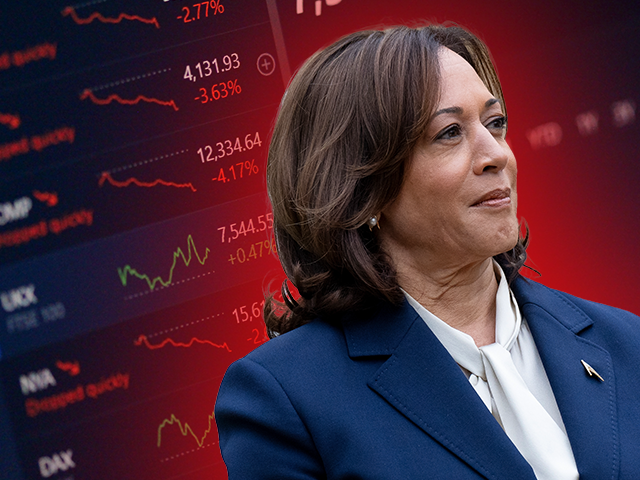The Price of a Harris Presidency Weighs on Stocks
Investors fear a Kamala Harris presidency.
While the well-behaved financial media outlets pinned the sell-off in stocks on Wednesday morning on the unexpected increase in core inflation, the severity of the moves in equities and bonds indicates something more is at work than a one-tenth of a point move in the index of consumer prices excluding food and energy.
The economic agenda pushed by Harris is toxic for stocks because it is centered around tax increases and climate change policy, and has almost no growth components.
Donald Trump’s 2018 Tax Cuts and Jobs Act brought the federal corporate tax rate on domestic income down from 35 percent to 21 percent. Inclusive of state and local taxes, the statutory corporate rate in the U.S. is actually about 26 percent, according to a recent analysis by Goldman Sachs. That puts us close to the OECD median of 24 percent.
Harris has said that she would raise the federal corporate rate to 28 percent, which would bring the all-in corporate rate to around 33 percent. That’s well above the median rate, meaning U.S. based companies would be at a tax disadvantage with global competitors.
Goldman’s analysts estimate that each one percentage point change in the statutory domestic tax rate would shift S&P 500 earnings per share by slightly less than one percent. So, raising the corporate rate by seven points would push earnings down by five points, according to Goldman. Combined with other Harris proposed changes to the corporate tax code, earnings would likely fall by eight percent. That obviously has big implications for stock prices, which are based on multiples of future earnings.
That calculation does not include the likelihood that the higher tax rate would stifle economic growth, which would in turn further reduce earnings and therefore stock prices.
The sell-off Wednesday is probably just the beginning. As Goldman’s analysts note, the rally in stocks that followed the tax cuts got started immediately after Trump’s unexpected victory in 2016 but really only took off when investors could be certain the tax cuts were really coming. In particular, stocks of companies especially exposed to changing tax rates moved much more as the bill moved through Congress.
In the case of a tax hike, the opposite is likely to play out. If the market becomes more convinced that Harris could win in November, tax-sensitive stocks will likely sink further, especially if it looks like Democrats could have working majorities on Capitol Hill.
More Inflation, Fewer Rate Cuts
The market is also likely worried about the inflationary effects of a Harris presidency. Despite all the carping about tariffs pushing up prices, recent history demonstrates that Trump’s policies did not result in inflation. Indeed, the Fed started cutting interest rates even before the pandemic arrived once it became clear that there were no inflationary effects from the China and metals tariffs. Instead, we got inflation under the Biden-Harris policies that Harris is very likely to double-down on if elected to the main office in the White House.
A continuation of the inflationary fiscal and regulatory policies of the Biden-Harris administration would mean that the Fed would have less room to cut interest rates. That’s likely a big driver of the moves in bonds and equities on Wednesday as investors think rates might not be coming down as much as previously expected.
The Tax on Unrealized Gains Will Hit Stocks Hard
Harris has also promised a tax on unrealized capital gains. This would likely prompt a sell-off in stocks and create undesirable volatility because wealthy investors would be forced to sell assets to pay their tax bills. As a Wall Street Journal opinion piece recently explained, even a tax confined to billionaires would be consequential for markets:
Billionaires alone own more than $5 trillion in stock, or 7% of the entire stock market. Public stock represents 66% of their wealth, so they would need to sell hundreds of billions of dollars worth of stock to fund their wealth-tax payments. These sales would drive down stock prices and, therefore, returns for all investors. The largest, most innovative and fastest-growing U.S. tech companies would be hit the hardest. Unrealized capital gains are concentrated in these companies.
This wouldn’t be a one-time problem. Stock sales would need to continue each year to pay the annual wealth tax. This would be a long-term drag on the returns of all investors, while also reducing the skin in the game of the innovative founders who built these companies. The wealthiest Americans would be entitled to tax refunds in future years if the value of their remaining stock holdings goes down, but that wouldn’t diminish the effect of the tax on capital markets.
Stocks would also likely become a disfavored asset class because investors in illiquid privately held companies would enjoy a tax deferral shield that would let them avoid forced tax sales. One effect of this would be lower prices for stocks. Another would be pressure on companies to go private to shield their investors from the tax.
Typically, markets do not react all that much to presidential politics. That wasn’t the case in 2016, however, when Trump’s election sent stocks soaring. The severity of Harris’ tax hike plans might make for another exception.

COMMENTS
Please let us know if you're having issues with commenting.